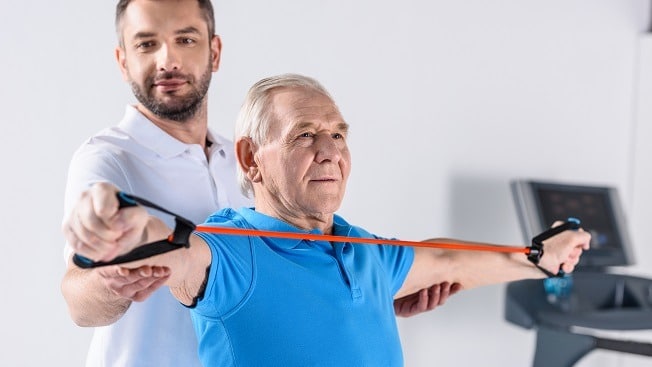Research has shown exercise can dramatically enhance health improvements regarding the physical and mental quality of life for patients with cancer such as colon and breast. Now a randomized controlled study published in the Nature journal, Prostate Cancer and Prostatic Diseases is showing that men diagnosed with prostate cancer while undergoing androgen deprivation therapy (ADT), benefit both physically and mentally when exercise is part of the treatment plan too.
“This is very encouraging since having a diagnosis of prostate cancer while treated with ADT can be psychologically devastating, explained Dr. David Samadi, Director of Men’s Health and Urologic Oncology at St. Francis Hospital in Roslyn, New York. “Androgen deprivation therapy is a hormone therapy commonly used to treat prostate cancer. Since prostate cancer cannot grow or survive without androgens, like testosterone, ADT’s purpose is to reduce the number of androgens in a man’s body to slow the growth of cancer and shrink the tumor. However, side effects of ADT may include osteoporosis, loss of muscle mass, and increased weight gain. Factor in depression and anxiety, and it’s like a double whammy making it difficult for men to cope well.”
Benefits of exercise for prostate cancer patients
For this study, 135 prostate cancer patients aged 43-90 on ADT were randomly selected to receive twice-weekly supervised activity of either resistance exercise or aerobic exercise for 12 months. During this time frame, each patient had their psychological distress measured using the Brief Symptom Inventory-18, which includes assessing anxiety and depression. Once results were in, the research found that exercise not only offered men with prostate cancer physical benefits but also reduced symptoms of depression and anxiety.
“As a urologic oncologist, I always tell men with prostate cancer to exercise. You’ll feel better both physically and mentally. This new research backs up my advice showing that exercise boosts men’s mental health by lowering depression and anxiety,” stated Dr. Samadi.
It’s been observed in past studies that men with prostate cancer, who are not physically active, will suffer more from anxiety than men who make working out a priority.
“Men with prostate cancer engaging in physical activity helps them feel more in control of their situation giving them an outlet,” exclaimed Dr. Samadi. “Men hide their feelings. This is concerning since one in four men experience anxiety and up to one in five men report depression both before or after prostate cancer treatment. If you don’t talk about it, these symptoms may go unnoticed. We know exercise works like an antidepressant. Feel-good endorphins are released, it reduces stress, it should automatically be prescribed to all cancer patients with guidance and supervision.”
Dr. Samadi went on to add, “I firmly believe that exercise should be considered an anticancer therapy and all men should be encouraged to find ways to include it in their daily life. It’s cost-effective, a natural approach, and perfect for preserving their quality of life, physically and mentally.”


